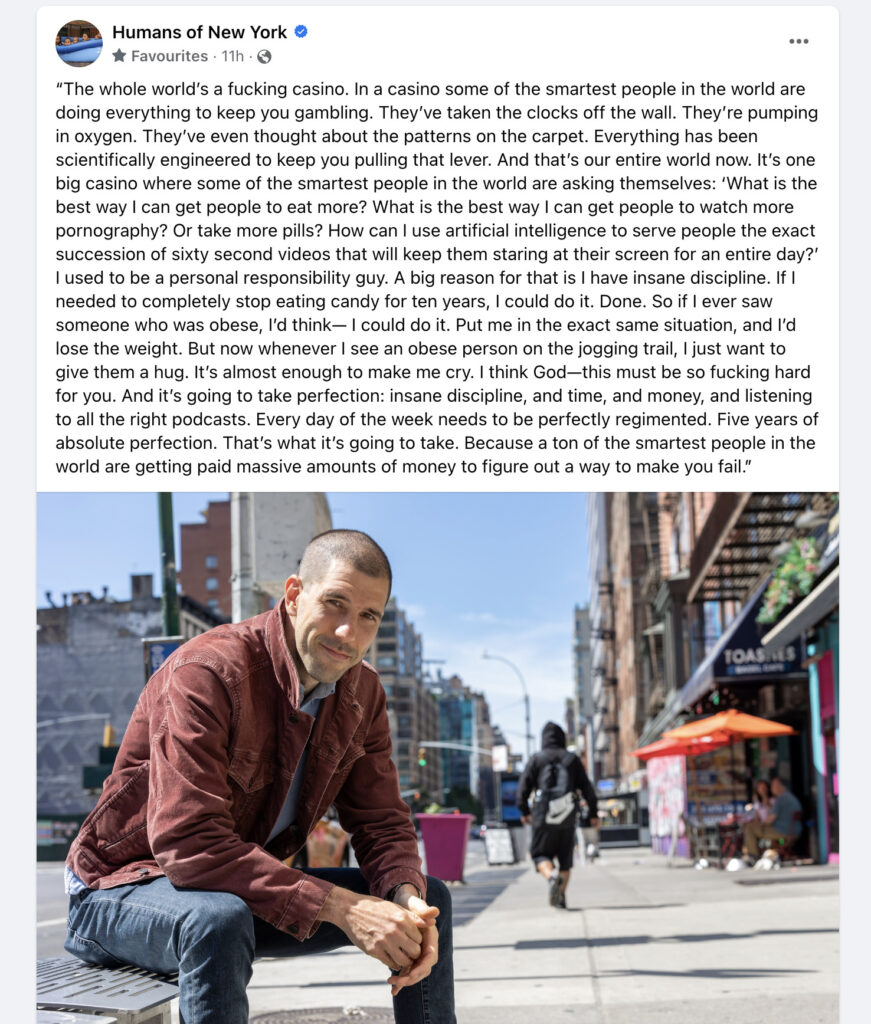I fell again for an urgency seeking headline. Steven Bartlett’s latest podcast episode with Mo Gawdat on AI was screaming: EMERGENCY EPISODE: Ex-Google Officer Finally Speaks Out On The Dangers Of AI! …and so I started watching, even though I knew Steven’s marketing tricks already.
He made me click. He competed for my attention and won. The content of the episode wasn’t even reflecting the title – it wasn’t an emergency per se, at least not in the standard meaning of the word. It wasn’t the “final” speech of Mo’s, as he’s been advocating about the pros and cons of AI for many years now, lately releasing his revised Scary Smart book (coincidence?).
Yet, I didn’t feel fooled, because somewhere in the middle of the episode, Steven admitted why he decides to stage a “crisis” in almost everything he does – so others take action.
Illusion of urgency
In a world where everything is designed to suck you in, it’s hard to assess what should we give attention to. Attention means money. Eyeball hang time.
In contrary to most meaningless clickbait’y articles, if a message we want to convey has a merit and the reader can derive value from it, one can justify such sneaky pull.
It’s a mad world out there, and even if you have good intentions, you gotta play the game. Especially when you are the good guy challenging status quo.
I’m sure you heard the narrative surrounding the climate crisis which emphasises that we are dangerously close to the point of no return, with the anecdotal two minutes to midnight. It highlights the urgent need for immediate action to address the environmental challenges we face. It serves as a call to prioritise sustainability to secure a healthier future for our children and the generations to come (if let loose AI doesn’t decide to eradicate us by then – but that’s a topic for my upcoming post).
While this crisis narrative is justified, there are many situations, which underlying goal is nothing more than enrichment of individuals or organisations. (Ps. Follow the money).
Developing indifference v5.1
In an era dominated by sensationalised content and attention-grabbing headlines, this tactic has become pervasive across various media platforms. Companies and individuals alike exploit this approach, manipulating our emotions and exploiting our immediate needs to achieve short-term gains. Because let’s be honest, we, as people, are really short sighted and care mainly of our immediate needs.
At its core, crisis staging is a form of manipulation. By leveraging psychological phenomena such as scarcity, fear of missing out (FOMO), and confirmation bias, those who employ crisis staging play on our vulnerabilities and instincts. The scarcity principle, for example, capitalises on our unconscious drive to value what is limited, creating a false sense of urgency around products or issues.
Nothing works better than fear. We’re driven by it. If there is no villain, create one. It’s a well known tactic widely used in the realm of marketing and business development. Building a Story Brand” book by Donal Miller explains about the hero and villain concept to create a sense of urgency and drive sales.
To enhance the hero’s journey (the client), businesses often introduce a villain—a problem, challenge, or obstacle that the hero must overcome. And they exaggerate it for often monstrous sizes. This serves as the catalyst for action, prompting customers to realise the urgency and necessity of finding a resolution. This strategy may drive immediate action, but it often lacks substance and fails to deliver long-term value.

Bad news – that limited offer of Tony Robbins course that you just couldn’t say no to won’t magically change your life, if you don’t stop slacking, start developing discipline and take ownership of your actions.
When companies and leaders-alike constantly resort to crisis staging and overdo it, they risk eroding trust and credibility. When we’re are repeatedly exposed to exaggerated or manufactured crisis, we become desensitised and develop a healthy skepticism. The constant barrage of clickbait headlines and sensationalised content has bred a culture of cynicism, making it increasingly challenging for us to differentiate between genuine concerns and manipulative tactics. Consequently, the very urgency created through crisis staging loses its potency and impact.
Emergency call brings prioritisation.

In an ideal world, rather than relying on cheap psychological tricks, we would shift our focus towards authentic action that addresses the root causes of the problems we face. Manipulative fear inducing actions devalue the genuine efforts of those who strive to make a difference and provide true value. Authenticity should always be the driving force behind our actions…
…but we don’t live in an ideal superhero world, so either learn to play the game’s rules to break them to the benefit of all, or keep whining that you’re not getting heard.



![Start-ups and start-downs [Evoque Journey] louveciennes @flickr](https://hankka.com/wp-content/uploads/2013/09/bfast.jpg)
![Fail to raise [Evoque journey] WiLPrZ @Flickr](https://hankka.com/wp-content/uploads/2013/12/snipping.jpg)

